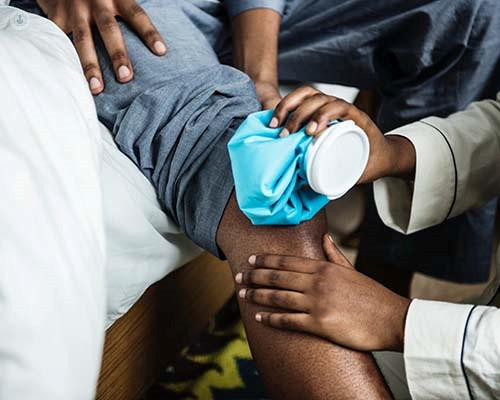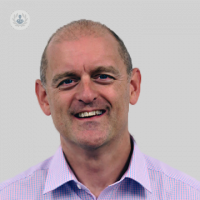CartiONE: A new treatment for knee cartilage injuries
Escrito por:Knee cartilage injuries can happen either suddenly or from general wear and tear with most injuries resulting in some swelling and pain inside the joint. Other signs of injury may include a locking sensation in the knee or a piece of cartilage becoming detached, which is very painful.
A new treatment to grow cartilage inside the patient’s knee is being pioneered at Spire Parkway Hospital by Consultant Orthopaedic Surgeon Mr Jamie Arbuthnot. CartiONE uses the patient’s own cartilage cells to regrow damaged cartilage after being implanted in the damaged knee.
Here Mr Arbuthnot answers some questions about CartiONE, how it works and how it differs from other treatments on offer.

What is CartiONE?
CartiONE is a new technique to repair cartilage defects in joints. A patient’s own cartilage cells are combined with that patient’s bone marrow to create what’s called chondrocytes or “cartilage cells”. The cells are attached to a patch or scaffold which is implanted into the joint to repair damaged cartilage and slow the progression of arthritis.
How is CartiONE surgery carried out?
During the knee surgery, cartilage cells are extracted from the patient’s knee from areas that carry less weight. These cells are then combined with the patient’s bone marrow cells by a scientist and applied to a “patch” or scaffold that will be implanted into the damaged cartilage.
How long does it take to feel the benefits of the surgery?
Pain generally improves quite quickly over the first few weeks following surgery. The newly implanted cells get to work on repairing the cartilage straight away, however, it usually takes up to nine months or more until the repaired tissue matures and the patient can enjoy the full benefits of the surgery.
Advantages of CartiONE
- Most techniques used to repair degenerative cartilage involve two stages, but CartiONE is a single-step procedure. The patient doesn’t have to wait weeks apart between one procedure and the next.
- Other treatments for cartilage repair such as platelet-rich plasma injections can improve a damaged joint but are usually used for widespread damage. CartiONE can be used to repair localised cartilage defects, as well as widespread defects.
- CartiONE uses the patient’s own cells (the chondrocytes that maintain cartilage) for the operation.
- The CartiONE technique can treat a number of different defects but works best in lesions up to 5cm square. There is much evidence to support that this technique provides long term relief from pain.
Is CartiONE suitable for everyone or will some people need a knee replacement?
A knee replacement is often the best option for widespread end-stage knee arthritis. CartiONE is intended to treat localised cartilage damage and prevent or slow down the progression of end-stage arthritis. If end-stage arthritis is already present, then a knee replacement is the better option.
Is CartiONE going to be the first stop for cartilage repair in the future?
At present cartilage repair surgery is at the forefront of biological science, so scientists and doctors have to keep on top of new techniques like CartiONE. This technique offers a single step to surgically repairing cartilage, unlike other techniques, so CartiONE is a very attractive method of cartilage repair, particularly in relation to knee pain.
If you’ve damaged your knee joint and you’d like more information regarding CartiONE, you can schedule a consultation with Mr Jamie Arbuthnot.


